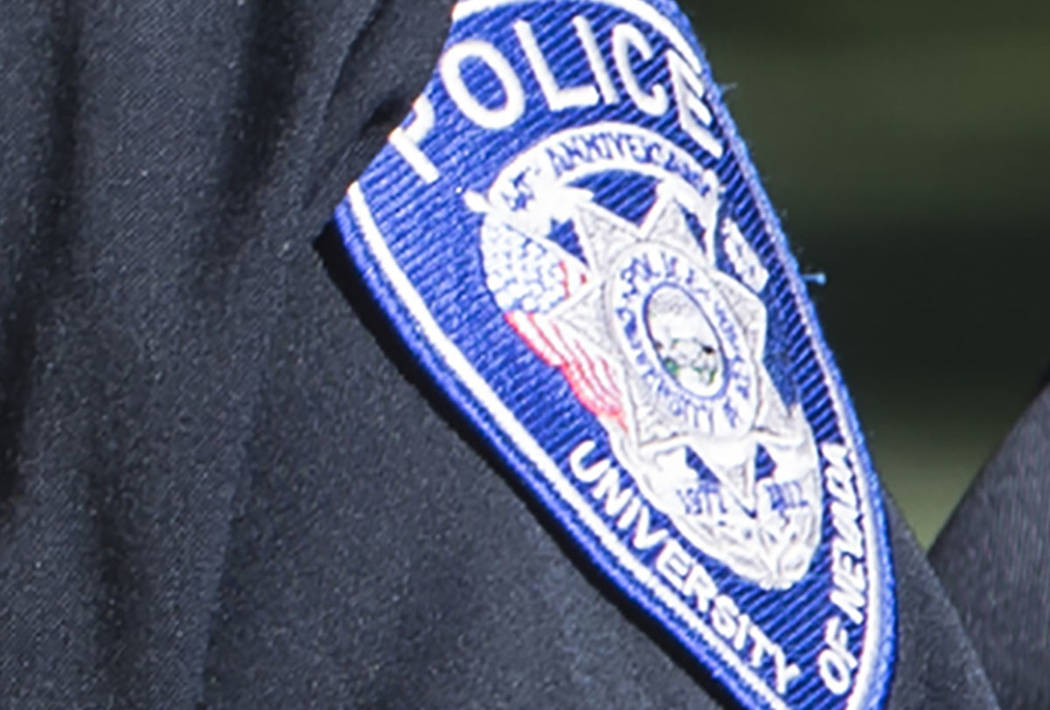Report details multitude of problems with UNLV police department

A study exploring the viability of consolidating police services across Southern Nevada’s higher education institutions reveals a UNLV police department that’s rife with problems and unable to support such a merger.
The International Association of Campus Law Enforcement Administrators found that UNLV’s police department lacks a coordinated approach to campus safety and security, with faculty, staff and students believing that safety is not a priority at the college.
“This perception also manifested in what was described as an increase in response times, a lack of police and security presence at night, a lack of a unified security technology program for the campus, broken security cameras,” the report read.
The review was commissioned by NSHE Chancellor Thom Reilly in September after both UNLV and the College of Southern Nevada failed to present a path forward for consolidation. Regents had requested that the two schools work together to present a plan for consolidation after the state’s northern institutions successfully merged.
“After reading the report, I felt strongly that I wanted UNLV and CSN to thoughtfully review the report and develop a plan going forward,” Reilly said. “I want them to have ample opportunity to address the issues that arose from the report.”
Reilly shared the report with the regents and the NSHE system on Thursday morning, when UNLV also announced that UNLV Police Department Chief Jose Elique will retire Dec. 1.
The “acrimonious” relationship and a “series of personnel issues” between the police executives at CSN and UNLV was highlighted in the report.
“This problem runs deep and is not likely to be solved overnight,” the report reads.
Myriad issues
Further complicating the matter are issues within UNLV’s police department, which include outdated equipment, old and deteriorated police cars, an unkempt dispatch center, and a failure to follow best practices in the areas of sexual assault, Title IX and the Clery Act.
The report also cites “widespread” concern among faculty, staff and students about “piecemeal” police department funding. Students questioned why Elique had to go to student government to raise money for 19 new emergency phones.
Samantha Bivins, a former UNLV student senator who led the effort to upgrade the emergency phones, also pushed for the department to produce an updated active shooter video. She said she believes the student effort “finally got the attention of the administration.”
“It wasn’t something that we had done before,” she said. “None of the Senate was proposing anything, and while I agree that students shouldn’t have to pay for it, I wanted to see $250,000 to be spent on safety, rather than sit in an account and just collect interest.”
The university has since allocated reserve funds toward safety upgrades, including replacing more emergency phones.
“It appears to me they’re on track to begin addressing some of the equipment and capital issues around public safety,” Reilly said.
Student Body President Christopher Roys has also continued to make campus safety high on the priority list, Bivins said.
The Rebel Rides program opened with a soft launch last month, Roys said. Student government purchased a high-tech golf cart for the police department to escort students to their cars.
“We definitely needed to be brought out of the 80s,” Bivins said. “We were lagging really, really far behind.”
‘Outright resistance’
CSN officials believed the university was lagging too, according to the report. IACLEA learned that the college no longer uses UNLV dispatching services because of outdated equipment. Members of the CSN police department also “repeatedly and emphatically” complained about the condescending demeanor displayed by UNLV officers.
Overall, IACLEA found “outright resistance” to a merger in the south, where the institutions as larger, more complex and more geographically widespread than the state’s northern institutions. But Margo Martin, acting president of CSN, said the campuses can find a way to work together.
“I don’t think these challenges are insurmountable, but I think they need to be addressed,” she said.
The report also outlined improvements that CSN needs to make.
The college uses 60 contract security officers, in addition to 17 armed police officers, to staff its locations. IACLEA said the college pays an “exorbitant” $1.8 million to contract with the security officers, and that the practice should be phased out. The report also said that the process to request CSN police services is “cumbersome.”
Martin said the college has eliminated six full-time contract security officers and an active recruitment is taking place to hire more police officers, but finding the money could be an issue because sworn officers get paid more.
“It’s one thing to say, we need to update our cameras, this, that and the other, but how do we fund that? Do we secure a grant? Do we add that to our budget request for the Legislature?” Martin said. “It involves planning and having a long-range trajectory for what we might do.”
The report also recommends a cultural, leadership and organizational assessment of the UNLV police department before a merger takes place, and that the state Board of Regents find a leader, like Adam Garcia, chief of police at the University of Nevada, Reno, to lead consolidation efforts. Garcia achieved a successful merger among UNR, Truckee Meadows Community College and the Desert Research Institute in Reno through “collaboration, innovation, self-assessment, communication, and team building, and by setting vision and goals,” the report said.
Safety on campus — including issues with culture, leadership and management of UNLV’s police department — is also an area that Reilly wants UNLV’s new Chief Operating Officer to tackle. Reilly created the position last month to address various operational deficiencies at the university, and amid public tensions with UNLV President Len Jessup, who is leaving for a new job at Claremont Graduate University. The four other key areas of concern include human resources, compliance, the School of Dental Medicine and the UNLV School of Medicine.
The report is also released at a time when CSN is searching for a new permanent president.
“We’ll also have two new presidents giving a fresh look at these issues, too,” Reilly said.
He said he will bring the full report, along with recommendations, to an Oct. 19 special meeting of the board.
Diane Chase, executive vice president and provost for UNLV, was not immediately available for comment.
Contact Natalie Bruzda at nbruzda@reviewjournal.com or 702-477-3897. Follow @NatalieBruzda on Twitter.
IACLEA Final Report – April 2018 (1) by Las Vegas Review-Journal on Scribd













